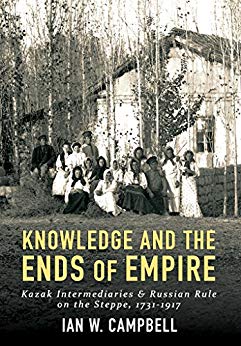
Knowledge and the Ends of Empire: Kazakh Intermediaries & Russian Rule on the Steppe, 1731–1917
Alva Robinson
Ian W. Campbell
Cornell UP, 2017,978-150-17007-98, $55 hb.
In 1731 the leader of the smallest of the three confederations of tribes covering the Kazakh steppe entreated imperial Russia, which through traders and soldiers had begun moving into northwestern Kazakh territory, for a military alliance against roving Kalmyk tribes. The alliance quickly became a process of Russian colonial control over all three tribal groups. Prior to this dominion, the Kazakh steppe inhabitants were just part of frontier society and “unknowable … to the tsarist state,” writes Campbell. Russian military and economic expansion continued, however, through Kazakh intermediaries, “principally the humble clerks, scribes, and translators who were the lifeblood of the imperial state.” Campbell relies on the records of ethnographer Chokan Valikhanov and researcher Älikhan Bökeikhanov for his insightful discussion of these intermediaries. This book shows how a subordinate group is able to create and affect beliefs based on the transmission of knowledge, becoming an active participant shaping the social and political dynamics of power relations.
You may also be interested in...

Archaeology and Geology of Ancient Egyptian Stones—Book Review
In categorizing the stones the ancient Egyptians used, author James A. Harrell unites geology, archeology and cultural history in one monumental reference.
A History of Mali’s National Drink Traces Green Tea—Book Review
By tracing ritual instead of commerce, anthropologist Ute Röschenthaler shows that the story of tea in West Africa involves multidirectional routes and local agency.